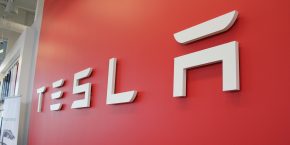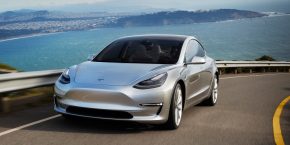

Tesla has yet to deliver a single Model 3 and probably won’t for another 18 months, but the fact that close to 300,000 people already signed up to pre-order the vehicle is already disrupting the industry. During Daimler’s annual shareholders meeting in Berlin on Wednesday, several shareholders have expressed concerns over Silicon Valley-based companies – especially Tesla – leading the electric vehicle market.
The Financial Times reported on three particular questions shareholders asked Daimler’s management:
[A shareholder] warned the automobile industry faced “a radical upheaval, driven by attacks from Silicon Valley”. Among other products, Alphabet is developing a self-driving car.
Another Daimler shareholder complained to management: “We don’t really have a product for this competition from Tesla. In the long term we have some great vehicles … but they are virtual at this point.”
A third shareholder said there was no adequate European competitor to Tesla’s latest model. He asked management: “What is the reason for that?”
Daimler CEO Dieter Zetsche responded by highlighting Mercedes’ plan to have 10 plug-in hybrid in its vehicle lineup by 2017 and an all-electric car with a range of ~300 miles (500km) by the end of the decade.
The German automaker’s current EV lineup:
Daimler’s EV vehicle lineup primarily consists of Mercedes’ plug-in hybrid vehicles, but also the all-electric B-Class.
Earlier this year, Daimler green-lighted 4 new long-range electric vehicles, which will reportedly be two sedans and two crossover SUVs build on Mercedes’ electric vehicle architecture “EVA”. The first vehicle should hit the market in 2018.
The company also recently announced an important €500 million ($543.5 million) investment in a new battery factory in Kamenz, Germany, through its ACCUmotive subsidiary. The battery pack of Mercedes’ only all-electric vehicle, the B-Class, is manufactured by Tesla Motors with battery cells from Panasonic, but the automaker already confirmed it wouldn’t renew Tesla’s supply contract.
The partnership between the two companies was also the subject of question by a shareholder during the meeting on Wednesday. In May 2009, Daimler bought a 9% stake in Tesla for $50 million. Tesla CEO Elon Musk once referred to the investment as vital to Tesla staying in business during that difficult financial time.
A shareholder asked if the company disposed of its shares in Tesla too early. Daimler sold its remaining shares in October 2014, making ~$780 million in profit. Tesla’s stock is up about 5% since October 2014.

FTC: We use income earning auto affiliate links. More.




An all electric 300mi NEDC (210mi actual) with batteries and supplied from third parties making sure it will cost 70k+ with no specs to match even today’s model S, not to mention the level of software, regular OTA updates, or supercharger network. All that coming to a store near you in 2020. Yep, sounds like just the rest of the head-in-sand fossil companies out there.
But hey, we will have 10 plug-ins with 7 to 15 mile range!
7 to 15 mile range ?
Wow that is long distance range !!! 🙁
And the rest ?
CO2 in the air ???
Congratulations.!!!
Yeah. Both s550e and c350e are rated well under 15-20 miles by EPA.
They need to step up. They have been dragging their feet losing market share of their most profitable cars. In it’s class Tesla increased 61% last yr while Euro lux sport sedans all lost production to the Tesla S, now with the X too.
With the 3 will take a lot of the mid size pricey cars and drop their share too .
None of the legacy manufacturers really ‘want’ to go full electric in my opinion. The largest remaining part of intellectual property is the ICE, which is rendered obsolete when moving to BEV. When I look at the Model 3 my feeling is that they have a bunch of problems, to me it looks like something from the future, only comparable to a Porsche, Aston or Bentley in look at entry level luxury pricing. Electric is just plain better from a fundamental physical point of view, faster and more efficient so you get better than Ferrari performance and better than Prius fuel economy in the same car. Then the high tech companies and Tesla have autonomy coming, which combined with electrification offers the possibility for new car sharing models (no driver cost and minimal energy cost). This model isn’t for everyone but the reality is that a car is the biggest single depreciating asset people own and is used only a small percentage of the time (hours in the day) for most people. Cars are just massively wasteful in financial and physical resources. Autonomous car sharing could dramatically reduce the total number of cars on the road and reduce the total market size and revenues for these companies. That doesn’t matter for Tesla, Apple or Google as they have such small (or non-existent) shares today that they have massive future growth even in a market half of today’s size. This is a tsunami of hurt coming for these guys. Unfortunately for them the low gas prices only play into Tesla’s master plan by getting more people back into gas guzzlers and discouraging and delaying legacy company investments in BEV. When will they all wake up.
They might not wake up in time with companies like Samsung, Apple, Google, etc getting in the business. To them this is just a simple servo control system.
Without the cost, complexities most any company could get into this business. I’m seriously thinking about it with the new law allowing a company to build 325 25yr old looking cars like a 63 Vette with minimal regulations/yr to build Lovin’s style Hypercar BEV and medium/raceboat composite tech which is lighter, stronger than CF and much more than steel or aluminum at lower cost than any of those.
It is the only way anyone is going to beat Tesla.
Sadly BMW screwed their i3-i8 up weighing as much as metal ones would when it should be 40% lighter in weight, cost because I think they didn’t want it to be that good as would obsolete their whole metal product line. So they stuck 700lbs of unneeded alum under it!!
And BMW knows better as they have built composite racecars and aircraft parts for decades.
If the US would change car regulations to where you didn’t need to be a billionaire to meet them big auto would be in big trouble than their inability to meet the market and make new ones.
What are you on about? They saved weight by indeed changing many components to CF, and then re-added the weight by installing a battery. Are you implying a battery is unneeded in an EV?
I’ve always said they already know this is the future. Not all, but many of them could already make competitive EVs, they have the technology to make a good electric car (e.g. BMW with its CFRP and hibrid synchronous motor technology), and they’ve already invested billions of € in developments. Than why don’t they hop in the EV business? Because the vast majority of the people still don’t want to buy an EV. According to this survey in Germany (http://insideevs.com/survey-what-german-new-and-used-car-buyers-think-of-evs/), only tiny fragment (about 4%) of new car buyers are actively interested in EVs (or any other alternative drive). And Germany is Europe’s biggest car market! I know, the German people are very conservative in this question, but I don’t think the global average is much better (maybe 5-6%). At first, this global interest has to reach a threshold (I would say 20%), than believe me, in a short period of time you’ll see 5-10 EV models per car maker. But nowadays the some ten thousand EVs per year that they could sell (specially with a probably small margin) is not a big deal for the majors, since they sell millions per year.
Anyway.. What’s your problem with the i3 and i8’s weight exactly??? They are the lightest cars in their category. The i3 weights only 1195 kg, and the i8 is only 1485 kg. Comparing them to the Model 3, which will be roughly 2 tonnes, they are like feather.
R3D, the problem for Daimler, BMW is not to bring EVs to the market, when they see sufficient demand. They may really have everything in place. The problem is, that they don’t care to build up any kind of fastcharging network. They just still don’t see, this is their problem. Gasoline isn’t either, isn’t it?
When the EV demand finally is “big enough”, nobody will want their cars, because only Tesla has Superchargers.
GM will face the same fate. The Bolt is a decent, utilitarian car. But why buy a Bolt in 2016 (Or an Opel/Vauxhall Ampera-E in 2017) and be confined to a 100 mile /150km radius, when I can drive my old ICE car just a year (or two… or three…) longer and take advantage of the supercharging Model 3?
If they were really holding stock, I would rather call them bagholders.
That picture of Daimlers EVs is quite telling. Even if they were 100% electric, they would still be traditional ICE-cars retrofitted to run on electricity, instead of cars that were designed from the ground up to be 100% electric. So they are half-assed EVs at best.
I’d love to buy one if they made one, but it has to have a viable answer to Tesla’s supercharger network.
It is hard to believe that companies such as BMW, Mercedes and Audi still invest billions of dolars in obsolete gas platforms R&D! Save your money and invest in electric drives and how to reduce the ridiculous weight of today’s vehicle, which would double the range!
No really really fast charging infrastructure except for the Tesla Super Charger network. They were warned. They were invited. They are now years behind.
So screwed.
No long range cars. No battery supply for meaningful numbers of long range cars. No charging infrastructure.
There is a good chance these companies will not exist in 10 years. Watch Tesla buy up their factories for 1/10¢ on $ like the California plant.
Dailmer is still busy designing ICE….They are coming so late to the electrifying game – that TESLA is winning. (Nokia was once a dominating leader in phones, but they lost out to a clever competitor – that saw the “shape of things to come”.)
The legacy car manufacturers don’t stand a chance. Tesla is building a new car-building robot (the Tesla factory) that they will replicate anywhere they need more capacity. In the mean time, it is building its own battery factory. The legacy ICE manufacturers are stuck paying someone else for the batteries on the front end, then they have 15-20% of added costs on the back end to support the dealership networks. As costs for BEV cars come down the legacy manufacturers only option will be thin margins on the cheapest car they can think of. At some point, the BEV initial cost will be less than the ICE and the cost to fuel the BEV will approach free (think a solar powered charging station delivered with each car, with a battery to store power to charge the car when it is docked at night). Not a pretty future.
The surveys that ask people if they are interested in a BEV are not to be believed as long as the subjects haven’t actually driven a BEV. Let then drive a Tesla Model S and then a similar M-B, Audi, Volvo or BMW. Then ask.